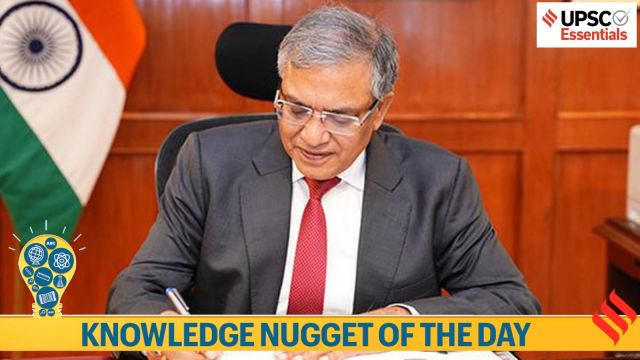Take a look at the essential events, concepts, terms, quotes, or phenomena every day and brush up your knowledge. Here’s your knowledge nugget for today.
🚨 Click Here to read the Union Budget Special issue of the UPSC Essentials magazine for February 2025. Share your views and suggestions in the comment box or at manas.srivastava@indianexpress.com🚨

Knowledge Nugget: Chief Election Commissioner
Subject: Polity
(Relevance: Constitutional bodies and their current developments are relevant for the UPSC CSE, as these bodies are explicitly mentioned in the syllabus. In this context, knowing the appointment process of the Chief Election Commissioner becomes important.)
Story continues below this ad
Why in the news?
Almost a year after his appointment as an Election Commissioner, Gyanesh Kumar was promoted to Chief Election Commissioner (CEC) on Monday. His appointment was announced shortly after a high-level panel, led by the Prime Minister, met to select the new CEC following Rajiv Kumar’s impending retirement on Tuesday.
Key Takeaways :
1. Gyanesh Kumar’s tenure as CEC will last till January 26, 2029, which will see him helm the Commission as it conducts 20 Assembly elections, the elections for President and Vice-President in 2027, and prepares for the 2029 Lok Sabha elections.
2. This year’s CEC appointment process was different from previous ones, as it marked the first time a selection committee was established to appoint the head of the country’s election watchdog following the passage of the Chief Election Commissioner and Other Election Commissioners (Appointment, Conditions of Service and Term of Office) Act, 2023.
3. Section 6 of the Act specifies this process for the appointment of the Chief Election Commissioner and other Election Commissioners. It states, “A Search Committee headed by the Minister of Law and Justice and comprising two other members not below the rank of Secretary to the Government of India, shall prepare a panel of five persons for consideration of the Selection Committee, for appointment as the Chief Election Commissioner and other Election Commissioners.”
Story continues below this ad
4. Under the new law, the selection committee consists of the Prime Minister, a Union Cabinet Minister, and the Leader of the Opposition or the leader of the largest Opposition party in the Lok Sabha.
5. Notably, Earlier, there was no law passed by Parliament for the appointment of the CEC and the two Election Commissioners who comprise the three-person poll body. The appointments were done by the President on the advice of the PM. Traditionally, the successor to the incumbent CEC has been the next senior-most Election Commissioner. Seniority was usually defined by who was appointed earlier to the Commission.
Controversy around the Chief Election Commissioner and Other Election Commissioners (Appointment, Conditions of Service and Term of Office) Act, 2023
1. In March 2023, a five-judge Constitution Bench of the court heard petitions arguing that no law existed for the appointment of the Chief Election Commissioner (CEC) and Election Commissioners (ECs). The petitions sought the implementation of a collegium-style system for these appointments. The court ruled that the CEC and ECs would be appointed based on the advice of a committee consisting of the Prime Minister, the Leader of the Opposition in the Lok Sabha, and the Chief Justice of India (CJI).
2. Subsequently, however, Parliament brought The Chief Election Commission and Other Election Commissions (Appointment, Conditions of Service and Term of Office) Act, 2023, leaving out the CJI from the panel. Under the new law, the selection committee would consist of the Prime Minister, a Union Cabinet Minister, and the Leader of the Opposition or the leader of the largest Opposition party in the Lok Sabha.
Story continues below this ad
3. This was challenged before the apex court by the NGO Association for Democratic Reforms and Madhya Pradesh Congress leader Jaya Thakur but the court has so far refused to stay the new law.
4. In January this year, the Supreme Court said it will consider hearing in February petitions challenging the constitutional validity of the 2023 law which deals with the appointment of the CEC and Election Commissioners (ECs). The Supreme Court is scheduled to hear a petition challenging the validity of the Act today.
BEYOND THE NUGGET: Election Commission of India and Associated Constitutional Provisions
1. The Election Commission of India (ECI) is a permanent, independent, and constitutional authority responsible for conducting free and fair elections in the Union and the States of India.
2. The ECI is empowered to supervise, oversee, and manage elections to Parliament, state legislatures, and the offices of President and Vice President of India. Since the ECI does not oversee elections to state-level urban bodies like municipalities and panchayats, there is a separate State Election Commission.
Story continues below this ad
Constitutional Provisions
The Part XV of Constitution of India deals with Elections. It has the following articles (Articles 324–329) to empower the Election Commission and provide insight into the potential roles and functions of the commission.
1. Article 324: The superintendence, direction and control of the preparation of the electoral rolls for, and the conduct of, all elections to Parliament and the Legislature of every state and of elections to the offices of President and Vice-President.
2. Article 325: No individual to be excluded from electoral rolls on the basis of religion, race, caste, sex or any of them.
3. Article 326: Adult suffrage shall be the basis for elections to the House of the People and to the Legislative Assemblies of States.
Story continues below this ad
4. Article 327: Parliament may, according to the provisions of this Constitution, from time to time enact laws with respect to all matters relating to elections to Parliament and Legislative Assemblies of States.
5. Article 328: A state’s Legislature may from time to time by law make provision with respect to all matters relating to, or in connection with, the elections to the House or either House of the Legislature.
6. Article 329: The article prohibits the courts from becoming involved in electoral matters.
(Reference: Gyanesh Kumar is new CEC, SC to hear challenges to appointment law next month, Election Commission of India: Composition, powers and functions)
Story continues below this ad
Subscribe to our UPSC newsletter and stay updated with the news cues from the past week.
Stay updated with the latest UPSC articles by joining our Telegram channel – Indian Express UPSC Hub, and follow us on Instagram and X.


































